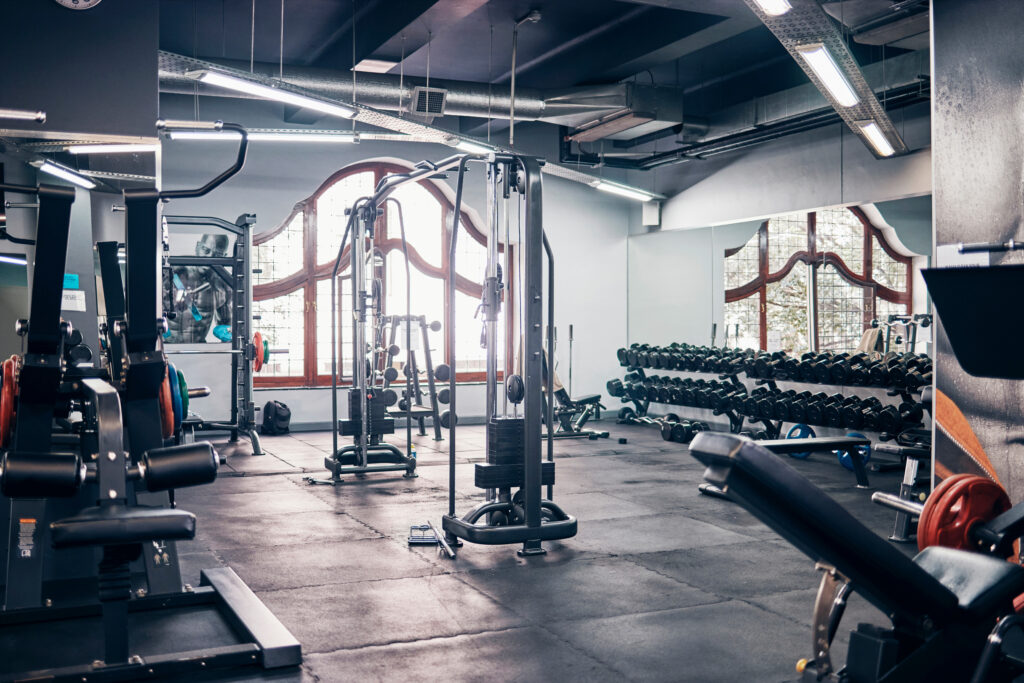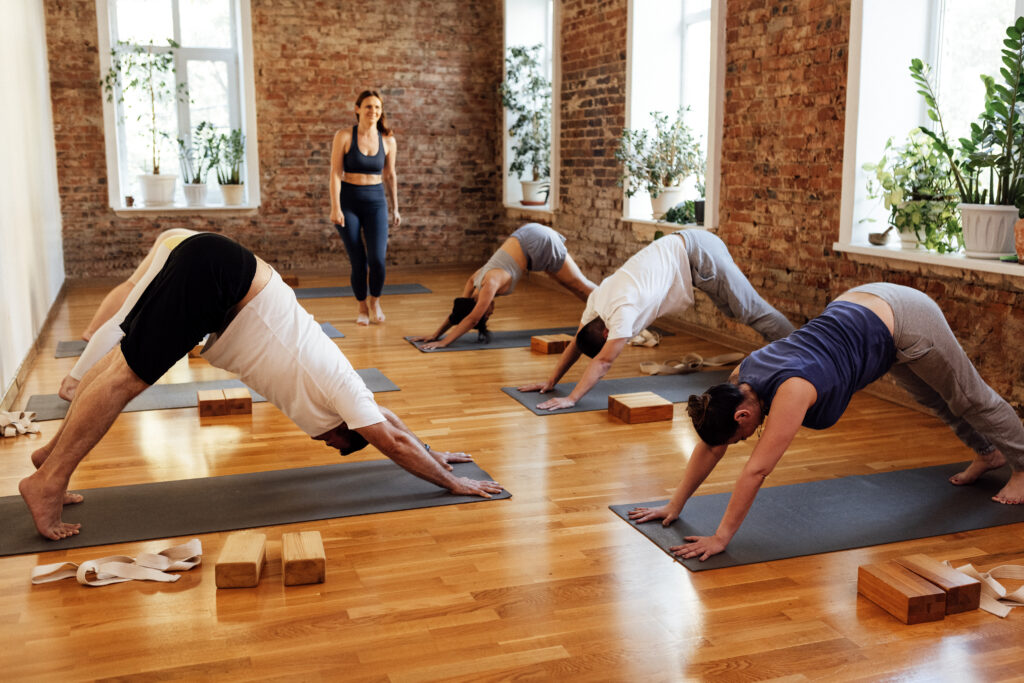Have you ever found yourself wondering what a gym is, or what a health club is, and what the actual difference is between them? If so, you’re not alone!
For the most part, the terms gym, health club and fitness centre tend to be used interchangeably, and it makes sense because there is an overlap in the services they provide. Yet, each represents a slightly different type of facility and understanding the difference is the first step in choosing the right space to support your personal goals.
In this blog, we break down the definitions and key differences between gyms, health clubs and fitness centres to help you make informed decisions about your wellness journey.
In This Article
- At a Glance
- What Is a Gym?
- What Is a Fitness Centre?
- What Is a Health Club?
- Difference Between Health & Fitness
- FAQs
At a Glance – Gym vs Fitness Centre vs Health Club
| Feature | Gym | Fitness Centre | Health Club |
| Cardio Equipment | Yes | Yes | Yes |
| Group Classes | Limited | Extensive | Extensive |
| Sports Facilities | Rare | Sometimes | Common |
| Wellness Programmes | No | Occasionally | Yes |
| Mental Health Support | Rare | Rare | Yes |
| Social/Leisure Areas | No | Possibly | Yes |
| Target Audience | Performance | Fitness & Wellness | Health, Wellness & Social |
What Is a Gym?
The term gym ( short for gymnasium) dates back to Ancient Greece, where it referred to facilities that combined physical exercise with education. In fact, many gyms in ancient times had libraries as well, and they were spaces to practice various sports, receive physical therapy and study.
Today, the gym is a space where people go to focus on physical exercise, like weight training, cardio, or simply keeping active. You’ll find machines, free weights and personal trainers around to help.
Some gyms stick to the basics, while others may offer a couple of classes or specialise in a particular style of training. Either way, they’re usually geared towards independent workouts in a no-frills environment.
Common Features
- Free weights
- Resistance machines
- Cardio equipment
- Amenities like lockers or showers
If you’re new to gym equipment or just want a refresher, check out our Gym Machine Names guide. It’s a helpful reference for understanding what you’ll encounter on the gym floor and how to use it confidently.
Different Gym Types
- Budget gyms – Low-cost access, often 24/7
- Boutique gyms – Small and specialised (e.g. boxing or HIIT only)
- Commercial gyms – Larger gyms with more equipment and personal training

What Is a Fitness Centre?
Fitness centres typically occupy more space than a gym because they tend to provide both indoor and outdoor physical activities, for example, a pool, running track or golf course.
Broadly speaking, fitness centres provide the same machines, free weights and equipment as a gym, but they also offer a larger array of amenities, group fitness classes and certified staff.
Fitness centres usually focus on whole-body health and house additional amenities like saunas & steam rooms, physical therapy and snack bars. Most fitness centres will also have personal trainers and nutritionists available to educate you on how to use the equipment or how to design a meal plan best suited for achieving your fitness goals. Overall, they can be a great choice if you’re looking for variety, support and a bit of extra comfort.
Common Features
- Gym-style equipment and free weights
- Group fitness classes (e.g. spin, Zumba, yoga)
- Pools, running tracks, sports courts
- Certified trainers
- Wellness staff
- Additional amenities like saunas, steam rooms and snack bars
Types of Fitness Centres
- Community fitness centres – Often council-run or non-profit, with a focus on affordability and accessibility
- Commercial fitness centres – Private operators offering full-service facilities with broader class options
- Specialist centres – Focused on recovery after injury, senior fitness or sport-specific training
Fitness centres tend to appeal to those who want a balance of self-guided workouts and structured support, often with added lifestyle and recovery services.

What Is a Health Club?
A health club takes the concept of a fitness centre and expands it into a full lifestyle experience. It’s not just about physical fitness; it’s about supporting your overall well-being in a more social and holistic way. Of course, you’ll still find workout equipment, personal trainers, etc., but you’ll also have access to amenities and services that promote relaxation, mental health and community.
The health club concept was first introduced in the U.S. in Santa Monica in the 1940s, though they actually began in France in the 1840s. Initially, these clubs aimed to promote not just exercise, but the idea of leisure and wellness as part of a balanced lifestyle. Over time, they evolved into premium facilities offering spa treatments, wellness routines and nutritional advice.
Common Features
- Workout equipment
- Fitness classes and personal training
- Wellness facilities (e.g. steam rooms, massage, spa services)
- On-site cafes or juice bars
- Mental health support or lifestyle coaching
- Recreational areas for socialising and relaxation
- Sports courts
Types of Health Clubs
- Lifestyle clubs – Offering a full suite of fitness, leisure and wellness services
- Family-oriented clubs – With crenches, swimming lessons and child-friendly spaces
- Medical wellness clubs and retreats – With rehabilitation services and tailored programmes to specific conditions and needs
Health clubs are often designed to be more than just a place to exercise. They create an environment where members can unwind, socialise and take care of their body and mind all under one roof.

Difference Between Health and Fitness
Still confused about what’s right for you? Understanding the difference between health and fitness might help clarify what each type of facility is truly designed to support.
- Fitness refers to the body’s ability to perform physical tasks and includes strength, stamina, flexibility and cardiovascular health.
- Health, on the other hand, is a much broader concept. It includes physical, mental and emotional well-being, alongside social and lifestyle factors.
This distinction matters because not all facilities serve the same purpose. While a gym might help you improve your fitness, a fitness centre can offer a more structured approach with access to guided classes, and a health club will support both health and fitness through a holistic mix of physical training and other well-being services.
To decide what’s right for you, you may want to visit a few facilities and ask for a tour so you can see what they offer firsthand.
Or, if you’re considering opening your own gym, fitness centre or health club, explore how EZFacility can help you get up and running easily with an all-in-one gym management software solution. Discover all features here or book a discovery call and let’s bring your vision to life.
FAQs
Is a fitness centre the same as a gym?
Not quite. A fitness centre includes most things that gyms offer, but adds group classes, wider facilities and sometimes wellness services.
What is the difference between health and fitness?
Fitness relates to physical performance, while health includes physical, mental and emotional well-being.
Which fitness facility is better for beginners?
It depends on your goals. For pure physical conditioning, a gym is ideal. If you prefer classes and socialising while exercising, a fitness centre may suit you better, while for a long-term lifestyle change or social support, opt for a health club membership instead.
Can I find nutrition support at a gym?
Most gyms don’t offer it, but fitness centres and health clubs often have nutritionists on staff.
